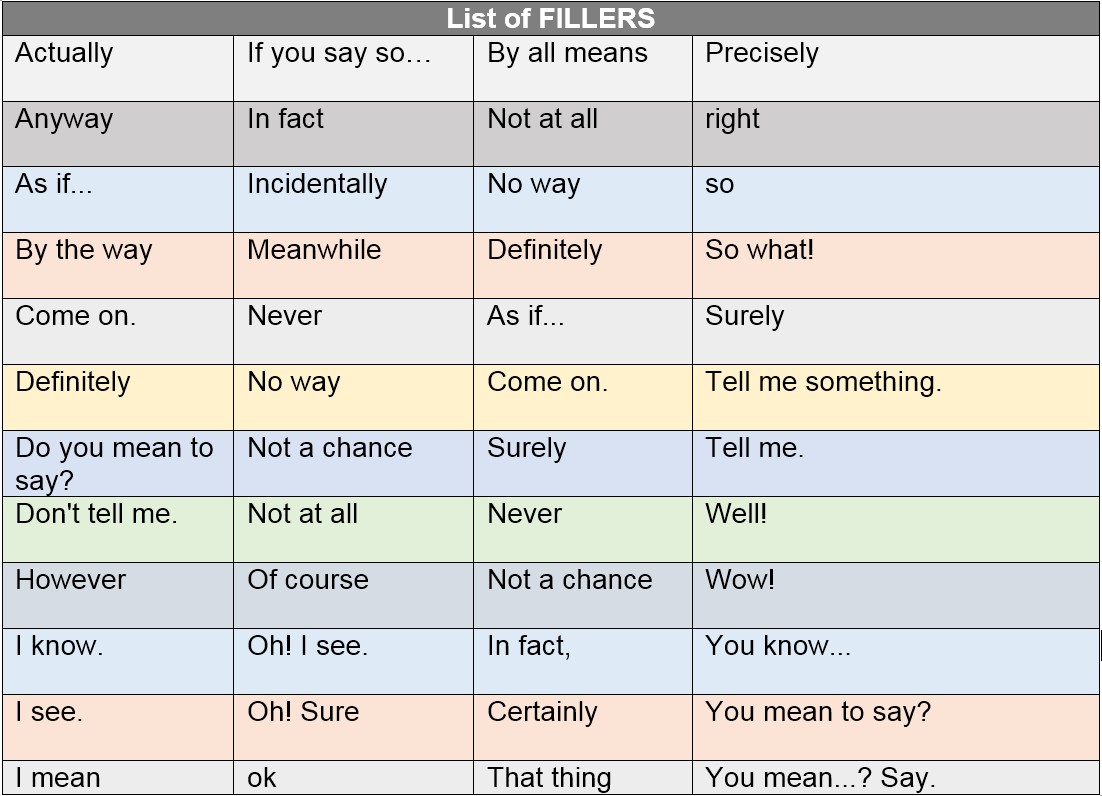Download
Basic English Grammar Book for Students PDF File
FILLERS
A filler is a sound, word or a phrase that is spoken in conversation by one participant to signal to others a hesitation or a pause to think without giving the impression of having finished speaking. Thus, it is also known as a pause filler, gap filler or a hesitation form.
They are used to fill silence when you are speaking. They don’t add any real value to the sentence.
When Are Filler Words Used in English?
- To show that you’re thinking.
- To make a statement less harsh.
- To make your statement weaker or stronger.
- To stall for time.
- To include the listener in the conversation without ending your sentence.
English language learners should know about fillers if they want to sound natural when speaking English. Here is a list of some fillers:
Sometimes people make sounds to keep a conversation going on:
- ahh
- er
- um
- oh!
- ah!
How Are Fillers Used?
Well… – probably the most popular English word is used to buy time while considering the question you’ve just been asked.
Example:
Well, I guess $50 is a good price for a good price of shoes.
You see… – it is usually used when you are explaining something to the person you are having a conversation with and you are hesitating a bit while thinking on how to explain the whole thing in detail. It is used to share a fact that you assume the listener doesn’t know.
Example:
I was going to try this awesome @Reks spelling app, but you see, I ran out of space on my phone.
All right… – this phrase is used as an affirmative reply. But, it can also be used as a hesitation filler while you are coming up with the best way to put your thoughts into words.
Example:
He is not coming? All right… all right …
I see… – this short phrase means “I understand”. It used to fill the void while you are dwelling upon the matter at hand. It’s very similar to all right.
Example:
A: Then, we went on a cruise because Mickey really wanted to be on a pirate ship so we picked an old sail ship.
B: I see…
A: But, we all forgot how sea sick Mickey gets and
B: I see…
A: …
You know… – it is usually added to the end of a sentence to make the conversation more casual. It is used to share something that you assume the listener already knows.
Example:
We stayed at that hotel, you know, the one down the street from Sintagma Square.
Like… – this word is used frequently in spoken English. Young people tend to use it is used excessively. It is sometimes used to mean something is not exact.
Example:
My neighbor has like ten cats.
Um / er / uh are mostly used for hesitation, such as when you don’t know the answer or don’t want to answer.
Example:
Um, I uh thought the homework was due tomorrow, not today.
Hmm is a thoughtful sound, and it shows that you’re thinking or trying to decide something.
Example:
Hmm, I like the pink bag but I think I’ll buy the black one instead.
I mean is used to clarify or emphasize how you feel about something.
Example:
I mean, he’s a great guy, I’m just not sure if he’s a good doctor.
You know what I mean? is used to make sure the listener is following what you’re saying.
Example:
I really like that girl, you know what I mean?
At the end of the day is a phrase that means “in the end” or “in conclusion.”
Example:
At the end of the day, we’re all just humans, and we all make mistakes.
Or something is used as a sentence ending that means you’re not being exact.
Example:
The cake uses two sticks of butter and ten eggs, or something like that.
Okay and so are usually used to start sentences, and can be a sign that a new topic is starting.
Example:
So what are you doing next weekend?
Right, mhm, uh and huh are all affirmative responses—they all mean “yes”.
Example:
Right, so let’s prepare a list of all the things we’ll need.
Uh huh, that’s exactly what he told me too.
Fillers are not to be confused with placeholder names, such as thingamajig, whatsamacallit, whosawhatsa and whats’isface, which refer to objects or people whose names are temporarily forgotten, irrelevant, or unknown.
Basic English Grammar Book for Students PDF File

